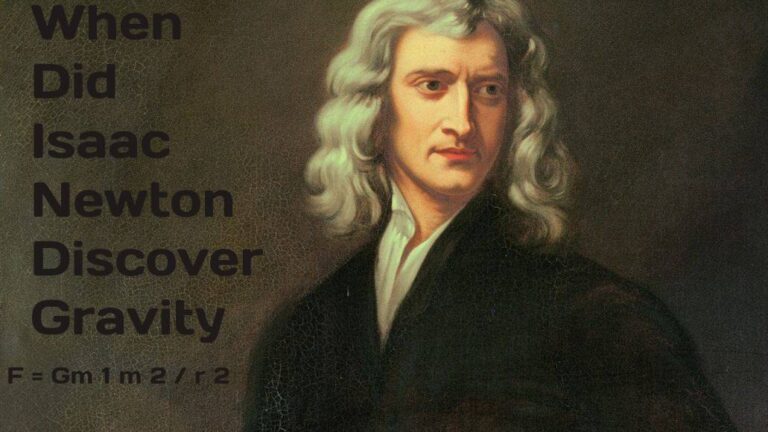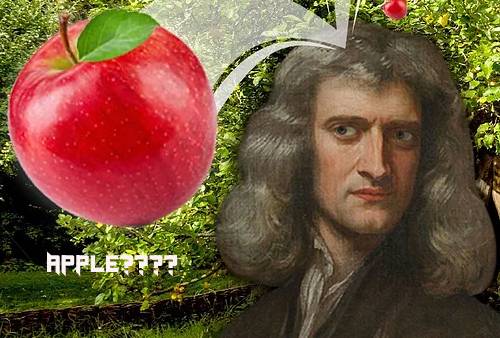Isaac Newton is one of the most famous scientists in history and is best known for his discovery of gravity. But what is gravity, and how and when did Isaac Newton Discover Gravity? Let’s explore this in the simplest way possible.
What Is The Definition of Gravity
Gravity is a force that tries to pull two objects toward each other. Gravity is a force that keeps everything in place. It pulls objects toward each other, like how it keeps us on the ground and makes things fall instead of floating away. Gravity also helps the moon stay in its orbit around Earth and keeps the planets in their orbits around the Sun. The more matter something has, the stronger its gravity.
Understanding Gravity
Gravity is the weakest of the known forces, but it always pulls objects together and never pushes them apart. Every object has some gravity, but bigger objects or objects that are closer together have more gravitational pull. For example, the Earth’s gravity is stronger on the moon than the Sun’s gravity because the moon is closer to Earth.
How Did Isaac Newton Discover Gravity
The story explains how Isaac Newton discovered gravity when he saw an apple fall from a tree. He wondered why the apple fell straight down instead of moving sideways or floating in the air. This simple observation made him think about how objects move and why they fall.
Newton realized that the same force that makes the apple fall is the one that keeps the moon in its orbit around Earth. He called this force “gravity.” He figured out that every object in the universe pulls on every other object with a force called gravity. The bigger the object, the stronger its pull.
Who is Sir Isaac Newton
Isaac Newton was born in England in 1643. His father died before he was born, and his mother remarried when he was three. Newton spent much of his childhood living with his grandmother. While he was studying at Cambridge University, the bubonic plague hit, and he had to take a break. During this time, Newton worked on his ideas about gravity, motion, and light. In 1687, he published his famous work, Philosophiae Naturalis Principia Mathematica, which explained his laws of motion and gravity. These laws became the foundation of classical mechanics, the branch of physics that deals with the motion of objects. Newton continued his research throughout his life and made many important discoveries. He died in 1727 at the age of 84.
Newton’s Laws of Motion
Newton’s three laws of motion explain how things move:
- The First Law (Inertia): An object will stay still or keep moving in a straight line unless something else (a force) makes it change.
- The Second Law (Force and Acceleration): The force on an object is equal to its mass times its acceleration. This means that heavier objects need more force to move or stop them.
- The Third Law (Action and Reaction): For every action, there is an equal and opposite reaction. This means that when you push on something, it pushes back with the same force.
These laws, along with his idea of gravity, became the foundation of physics, which is the study of how things move and interact.
Why is Gravity Important?
Gravity is crucial for life on Earth. It keeps us on the ground, holds our atmosphere in place so we can breathe, and keeps Earth at the right distance from the Sun. Without gravity, we couldn’t survive.
The moon also has gravity, which is why it affects the tides in Earth’s oceans. The moon’s gravity pulls on the water, making the tides go in and out.
Conclusion
Gravity is a force that’s always at work, keeping everything in place, from the smallest apple to the largest planet. Newton’s ideas continue to be important in science today, showing us how a simple question—like why an apple falls—can lead to great discoveries.
FAQ About When Did Isaac Newton Discover Gravity
1. According to Sir Isaac Newton, gravity depends on two factors. what are they?
According to Sir Isaac Newton, gravity depends on two factors:
- Mass of the Objects: The gravitational force between two objects is directly proportional to the product of their masses. The larger the mass of either object, the stronger the gravitational pull between them.
- Distance Between the Objects: The gravitational force is inversely proportional to the square of the distance between the centers of the two objects. As the distance between the objects increases, the gravitational force decreases rapidly.


